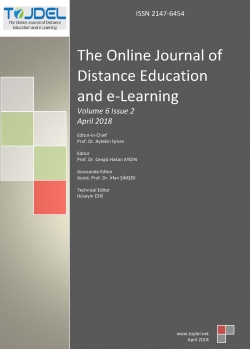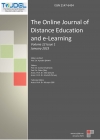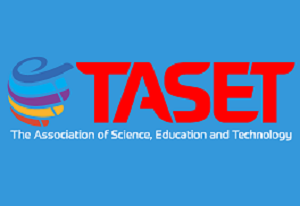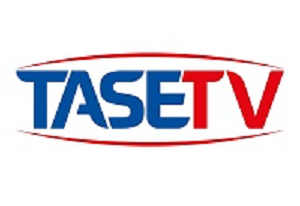TOJDEL - Volume 6 - Issue 2 - April 2018
 A HYBRID METHODOLOGY FOR MONITORING STUDENT ACTIVITIES IN A CLOUD BASED E LEARNING SYSTEM
A HYBRID METHODOLOGY FOR MONITORING STUDENT ACTIVITIES IN A CLOUD BASED E LEARNING SYSTEM O.Pandithurai, M.Geetha, Sumaya Jabeen A, Swathi Priya V C, Swetha M
Abstract:
There is a rapid growth in technology and advancement of E- learrning systems . E-Learning is a network
enabled transfer of skills that can enable people to learn anytime and anywhere. It is a platform that provides
easy access to the upgradation of knowledge and skills. In this paper we are using cloud computing technologies
and Intelligent video surveillance system in E-learning environment. Intelligent video surveillance system are
widely used nowadays. They monitor the activities of a student in an e-learning environment. The intelligent
surveillance system will learn the events itself by capturing the video and make a decision that whether the
event is usual or unusual. The histogram of optical flow orientation, entropy and magnitude (HOFOME) and
histogram of gradient are combined to preprocess the captured video frames. They classify the event based on
the machine learning approach called Support Vector Machine (SVM).
 ACCEPTANCE, USE AND SUCCESS OF E-LEARNING SYSTEMS IN DEVELOPING COUNTRIES: A COMPARISON FROM MALAYSIA AND TANZANIA
ACCEPTANCE, USE AND SUCCESS OF E-LEARNING SYSTEMS IN DEVELOPING COUNTRIES: A COMPARISON FROM MALAYSIA AND TANZANIA Deogratius Mathew Lashayo
Abstract:
Finding an effective model which guiding universities in developing countries on acceptance, use and success of
e-learning systems has been a tricky. This has been contributed largely with inadequate of factors explaining the
existing models. This research study is aimed at comparing and contrasting results of two developed models in
Tanzania and Malaysia respectively. Explored factors and hypotheses existing in two developed models will be
compared and contrasted. The unified model will be deduced which explaining the acceptance, use and success
of this systems. It implies that between these two countries there are considerable number of common factors for
guiding successfully acceptance, use and success of e-learning systems, however Malaysia has been better off in
terms of course contents, design and delivery. The significance of these result is on policy marking and strategy
formulation of educational institutions which are eager to have comprehensive e-learning systems in developing
countries, Malaysia and Tanzania in particular.
 ACCOUNTING AND TASK APPLICATION STUDENTS’ LEARNING STYLES IN DISTANCE EDUCATION
ACCOUNTING AND TASK APPLICATION STUDENTS’ LEARNING STYLES IN DISTANCE EDUCATION Kazım Kahraman, Mustafa Of, Yusuf Tola
Abstract:
Distance education could be expressed that less a philosophy and more a method of education. Students can
study in their own time, at the place of their choice (out of school or not), and without face-to-face contact with
a teacher. Technology is a main and most effective element of distance education.
This study reports on a case study conducted in a vocational high school investigating the opinions held by
students, with respect to technology and its application to education. Based on data gathered from distance
education students in an accounting and task application program. Q-methodology was used to identify
opinions, shared among students, on issues they considered important about the application of technology to
course instruction. The finding showed that the identification of participant opinion profiles based on the
similarities and differences by which they sort the statements in the Q-sample.
 ASSESSMENT IN PROPRIETARY INSTITUTIONS: HISTORICAL TRENDS, CURRENT PRACTICES AND THE FUTURE
ASSESSMENT IN PROPRIETARY INSTITUTIONS: HISTORICAL TRENDS, CURRENT PRACTICES AND THE FUTURE Pamela Wirth
Abstract:
The for-profit sector has come under intense scrutiny over the last decade as student debts have escalated and degree
attainment rates remain low. Legislative changes have pushed for more oversight and regulation of these colleges at
both the institutional and program levels. Issues related to program quality and student outcomes have caused the
for-profit education industry to take a closer look at its curriculum and student outcomes. Proprietary colleges are
increasingly realizing the value of assessment as both a marketing tool and tracking mechanism to support student
success. This paper will explore the historical impact of institutional assessment in proprietary education, current
practices and future trends.
 ATTITUDES TOWARDS ONLINE WEB ASSISTED LEARNING: ACCOUNTING AND TAX STUDENTS
ATTITUDES TOWARDS ONLINE WEB ASSISTED LEARNING: ACCOUNTING AND TAX STUDENTS İsmail Kılıçaslan, Sinan Aydın, Kenan Türkeri, Hüseyin Soydaş
Abstract:
Information and Communications Technology at all level of education has made positive effects to students’
learning. From day to day, the use of learning technologies in educational environments is increasing rapidly. As
a result of being technology a main part of education, education researcher should focus on the effect of
technology to students’ learning and their personality.
This research study examined the attitudes of Accounting and Tax Application students from a Vocational High
School towards a specific type of technology based learning, that of Online Web-Assisted Learning.
Data were collected to examine differences in attitudes between traditional learning (teacher centered
instruction) and Online Web-Assisted Learning, of differences in attitudes towards Online Web-Assisted
Learning between males and females, the correlation between Internet use and Online Web-Assisted Learning
attitudes, and the items that students find fascinating in Online Web-Assisted Learning.
 ATTITUDES TOWARDS ONLINE WEB ASSISTED LEARNING: BUSINESS MANAGEMENT STUDENTS
ATTITUDES TOWARDS ONLINE WEB ASSISTED LEARNING: BUSINESS MANAGEMENT STUDENTS Sinan Aydın, Yaşar Genel, Celal Mutlu
Abstract:
The internet technology today is a deep aspect of students’ lives. Students surf the World Wide Web (www)
daily to communicate, get information, listen music or play game and use the other technological activities.
Universities provide students with access to high level connections through a special network that students have
many alternatives such as information, sports and scientific knowledge.
In this study, it is examined that the attitudes of Business Management Students from a Vocational High School
towards a specific type of technology based learning, that of Online Web-Assisted Learning. Data were obtained
to analyze differences in attitudes between traditional learning (teacher centered instruction) and Online Web-
Assisted Learning, differences in attitudes towards Online Web-Assisted Learning between males and females,
the correlation between Internet use and Online Web-Assisted Learning attitudes, and the items that students
find fascinating in Online Web-Assisted Learning. The results indicate that there is compelling evidence for the
effective role the e-learning can play in developing the teachers’ teaching and the students’ learning.
 COMPUTER PROGRAMMING STUDENTS’ ATTITUDES IN DISTANCE EDUCATION
COMPUTER PROGRAMMING STUDENTS’ ATTITUDES IN DISTANCE EDUCATION Mustafa Of, Kazım Kahraman, Mustafa Kudu
Abstract:
Distance education or distance learning is the education of students who may not always be physically present at
a school or a classroom. By the period that universities add the use of distance education and training in their
education systems, education researchers need to discover how to make this educational method more attractive
for students.
In this research, it is examined the opinions held by students, with respect to technology and its application to
education. None of the students had any experience with online coursework. Q-methodology was used to
identify opinions, shared among students, on issues they considered important about the application of
technology to course instruction. The result suggests that approaches on how an educational program might fine
its online delivery for maximum suitability and acceptability to the broadest group of learners in vocational
school education.
 E-LEARNING SERVICE QUALITY AND USER SATISFACTION OF INSURANCE INSTITUTION IN TAMIL NADU, INDIA - AN EMPIRICAL STUDY
E-LEARNING SERVICE QUALITY AND USER SATISFACTION OF INSURANCE INSTITUTION IN TAMIL NADU, INDIA - AN EMPIRICAL STUDY P K Hariharan, G Barani
Abstract:
The introduction of innovative learning technique called synchronous e-learning in giving learning and preparing
has turned out to be main stream in the present e-learning condition. Be that as it may, the adequacy and student
fulfillment towards its utilization are as yet dark. This examination is led utilizing the subjective technique to
recognize the student fulfillment on the synchronous e-learning style and furthermore to distinguish what are the
issues and difficulties that can be enhanced towards the execution of fruitful synchronous e-learning. This
investigation has recognized the understudy's fulfillment level towards the utilization of synchronous e-learning
and furthermore distinguished a few issues that is connected to the shortcomings of the framework and the
difficulties looked by understudies.
 EMERGING TRENDS OF WEB 2.0 TOOLS IN ADULT EDUCATION
EMERGING TRENDS OF WEB 2.0 TOOLS IN ADULT EDUCATION Siti Hajar Halili
Abstract:
The use of Web 2.0 technology in teaching and learning activity has given learners and lecturers many
opportunities to establish intensive communication and interaction virtually. Some direct feedback can be given
by the lecturer to the students using Web 2.0. Adult learners as self-directed learners in higher education with
rich resources of learning experiences can potentially use Web 2.0 to support their collaborative learning
activities. The emergence of Web 2.0 as a collaborative technology brings about effective interaction and
communication virtually among students or with the lecturer. Online learning is one of the collaborative learning
models usually used by adult learners. There are many Web 2.0 tools available such as Facebook, Twitter,
YouTube, Blogs, Wiki, and Podcast for educational purposes. This paper provides a review of using Web 2.0
tools for adult learners.
 KNOWLEDGE SHARING AMONG FACULTY MEMBERS IN RESEARCH INSTITUTES IN IRAN
KNOWLEDGE SHARING AMONG FACULTY MEMBERS IN RESEARCH INSTITUTES IN IRAN Asghar Zamani
Abstract:
This study examines the factors influencing knowledge sharing among faculty members at research institutes in
Iran.In order to achieve this goal, with 14 experts and faculty members of research institutes of Iran were
interviewed.Analysis of the content of the interviews indicated that individual internal motivators, external
motivators, willingness to share knowledge with fellow faculty members, personal interaction and a group
faculty members, interpersonal context, inter organizational context, perspectives in knowledge production in
research institutions, In the process of knowledge sharing amongfaculty members research institutes in Iran
affected.
Also, the results revealed that faculty members in technical and engineering research institutes havehigher
personal and group interactions with their colleagues compared to humanities faculty members at research
institutes. Finally, results showed that technical and engineering faculty members have greater tendency to
collecting knowledge from their colleagues in comparison to humanities faculty groups.
 ON THE ATTITUDES OF CONSTRUCTION TECHNOLOGY STUDENTS TOWARDS INFORMATION AND COMMUNICATION TECHNOLOGY
ON THE ATTITUDES OF CONSTRUCTION TECHNOLOGY STUDENTS TOWARDS INFORMATION AND COMMUNICATION TECHNOLOGY Bülent Koparan, Üzeyir Akça, Fatma Köş Aydın, Sinan Aydın
Abstract:
Integrating Information and Communications Technology into education seems to be an important study area
for education researchers in the world. However, if teachers cannot make effective use of the information and
communications technology tools, the contribution of this subject to education is going to be a waste. In this
study, it is analyzed that the attitudes of Construction TechnologyStudents from a Vocational High School
towards a specific type of technology based learning, that of Online Web-Assisted Learning.
Data were collected to examine differences in attitudes between traditional learning (teacher centered
instruction) and Online Web-Assisted Learning, of differences in attitudes towards Online Web-Assisted
Learning between males and females, the correlation between Internet use and Online Web-Assisted Learning
attitudes, and the items that students find fascinating in Online Web-Assisted Learning.The research study has
generated a number of outcomes to the research question and the results indicate that some students engage in
and accept the use of Online Web-Assisted Learning to supplement their learning.
 REINFORCING DISTANCE EDUCATION THROUGH E-LEARNING AND E-ASSESSMENT PRACTICES USING ICT
REINFORCING DISTANCE EDUCATION THROUGH E-LEARNING AND E-ASSESSMENT PRACTICES USING ICT S. K. Rajesh Kanna, S. P. Vikram
Abstract:
Assessment is an essential fundamental aspect to be carried out in all the distance learning centers, to identify the
level of learners understanding and thereby the teaching methodologies can be enhanced to attain the desired
outcome. Especially in distance education, learners and teachers contact are minimal, level of learning by the
learners will vary and recent researchers proved that these voids can be filled with e-learning techniques. So, this
research is to identify the challenges in e-distance education and reinforcing those using information and
communication tools and has been experimented for the analytical subjects with four instructors and 45 students
in mechanical engineering under graduate discipline. The three modules of this research are formulation of elearning
concept maps, types of e-assessment methods and solution methodologies for the better online distance
education learning environments. The research concludes with recommendations synthesizing the better results
and enhanced learning for the e-distance education.
 THE EFFECT OF BASIC WEBQUEST COURSE ON CLASSROOM TEACHER CANDIDATES’ ATTITUDES TOWARDS USE OF COMPUTER BASED EDUCATION
THE EFFECT OF BASIC WEBQUEST COURSE ON CLASSROOM TEACHER CANDIDATES’ ATTITUDES TOWARDS USE OF COMPUTER BASED EDUCATION İrem Akçam Yalçın
Abstract:
The purpose of this study is to determine the effect of preparing a sample WebQuest, which is a Computer
Based Education material, on attitudes of prospective classroom teachers toward using Computer Based
Education. This study employed the single group pretest-posttest design. The study group included 112
freshman students who had enrolled in the Classroom Teaching Undergraduate Program of a public university
and received the “Computer II” course. Participation was on voluntary basis. The study group continued the
Computer II course for 14 weeks.The study was carried out for 14 weeks within the scope of the Computer II
course. Each week, prospective teachers received 2 hours of theory and 2 hours of practice. “The Personal
Information Form” and “The Attitude Scale towards Computer Based Education” developed by Arslan in 2006
were used for data collection.
Based on findings, it can be said that basic WebQuest training had a positive effect on attitudes of prospective
classroom teachers toward using Computer Based Education, gender had a positive and significant effect on
attitudes of prospective classroom teachers toward using Computer Based Education, owning a personal
computer did not have a significant effect on attitudes of prospective classroom teachers toward using Computer
Based Education and academic average did not have a significant effect on attitudes of prospective classroom
teachers toward using Computer Based Education.






